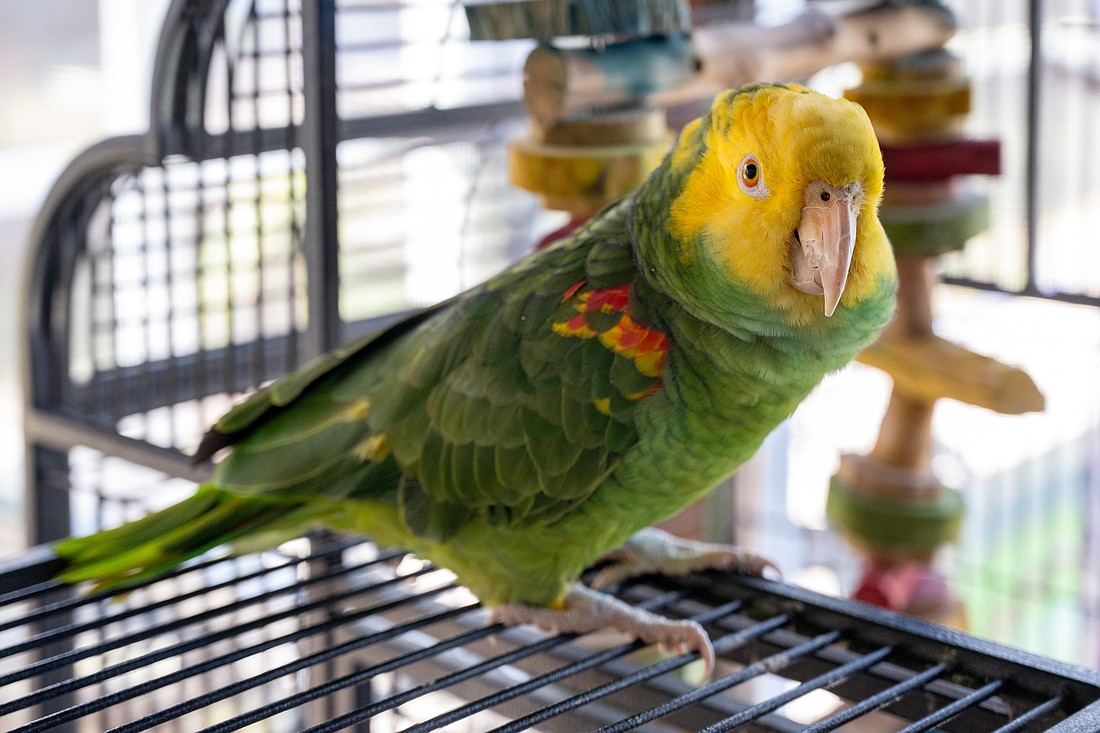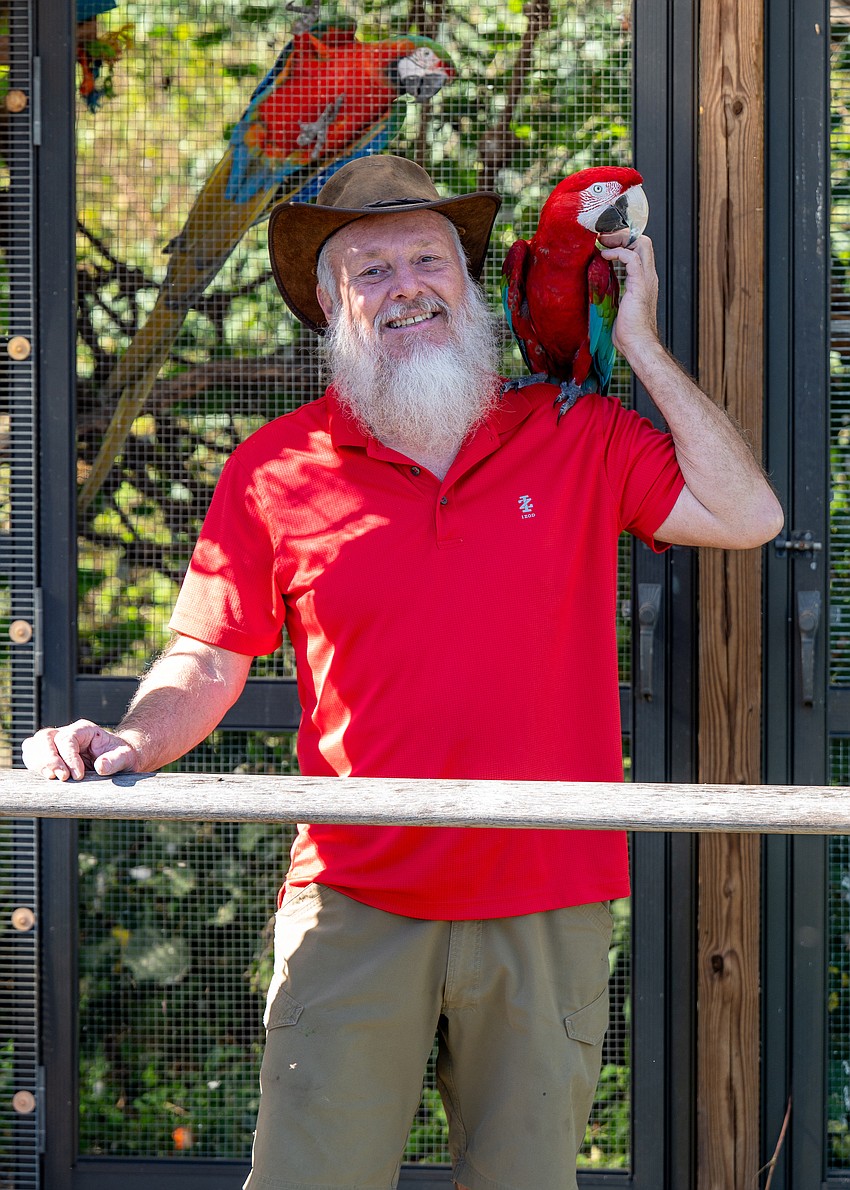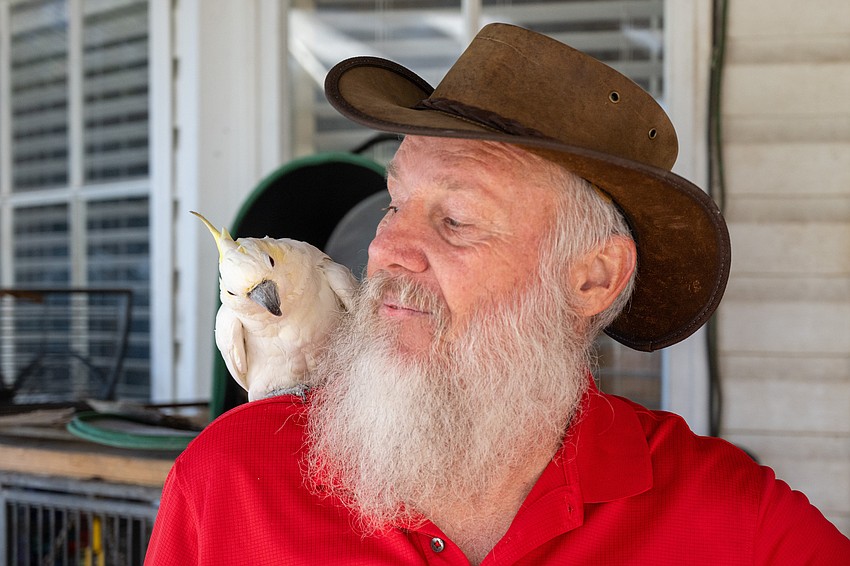- April 14, 2025
-
-
Loading

Loading

How does an Afghanistan war veteran go from considering suicide to running an emerging nonprofit from his home in Myakka Springs?
Short answer: Parrots.
Most of us are familiar with support dogs and equine therapy that help people cope with chronic illness, PTSD, depression and other mental and physical health challenges. Goats and pigs, too. Less so, parrots. Kind of makes sense, though, does it not? Parrots are beautiful. They’re funny. And they can talk.
Greg Para’s intimate relationships with the colorful birds helped him through a harrowing period in his life — just after he returned from a war zone in Afghanistan. The healing he experienced while playing, nuzzling and chatting with parrots inspired him to form his own nonprofit, the Sarasota Parrot Conservatory. Its mission is essentially two-pronged: to take in unwanted or rescued birds and provide them a home for life — he does not offer an adoption service — and to create mutually nurturing relationships between the parrots and emotionally scarred combat veterans, as well as other people suffering from PTSD. “I want to have birds here that are residents forever,” says the affable 61-year-old with a pillowy white beard that’s creeping down to the middle of his chest. “That way, the therapy can continue to develop as the birds create relationships with the people.”

Para, who lives with his partner, Lori Ludwig, has outfitted about half of his 5-acre property with enclosed aviaries and pens. The compound houses 78 parrots (as of mid-December), three dogs, a cat, three pigs, a horse, a donkey, two African sulcata tortoises, and Wallace, a playful warthog.
Para runs the operation with help from volunteers. He does not charge for his services. His current budget is around $65,000, which pays for the care and feeding of the animals. He doesn’t take a salary, instead covering his own expenses with veterans benefits from his 100% disability that encompasses both physical and mental issues. Para plans to increase his fundraising in the coming year so he can add on to the facility.
Parrots have the intellect and cognitive skills of a 5-year-old child, Para says, and they’re capable of rudimentary verbal communication. Some are highly empathetic. His combat-veteran clients are drawn to the facility’s avian therapy in part because it does not involve clinicians or medications. Those entering the program meander through the aviary and, in time, organically pair up with a parrot, developing a kinship that gives them a break from the torment swirling around in their heads.
“They’re very affectionate,” Para says of his birds. “They’ll kiss, they’ll climb on you, nestle in your neck, talk to you, joke with you, pester you.” As time goes on, “the vets will step into a place where they’re actually telling the bird what happened [in the war zone]. They’re telling the birds things that they could never tell a soul.”
When Para reactivated his status in the Navy reserves in his mid-40s to fulfill a goal of earning an officer’s commission, he did not expect to be deployed to the Middle East. “No, that wasn’t the plan,” he says with a rueful chuckle. Nevertheless, in 2011 he found himself a lieutenant junior in the Navy Cargo Handling Battalion 13 that supported the army operations in the Hindu Kush mountains of Afghanistan. While not directly involved in combat, he experienced his share of incoming fire and roadside bomb explosions. During Skype calls home with family, he’d chat with his parrot, Bella, which lifted his spirits a bit.
After a one-year tour, Para came home a wreck, anxious and hypervigilant in public places. He couldn’t drive. “I wanted to be dead,” he says. He was 49, with a wife and four kids, living in a residential neighborhood in Sarasota. He tried talk therapy and medicines but found the most solace at two local nonprofits specializing in avian rescue: Birds of Paradise Sanctuary and Save Our Seabirds. He volunteered at both. While at Save Our Seabirds, Para encountered a blue-and-gold macaw named Chico. Having been abandoned in a St. Petersburg apartment with no food and water for 10 days before being rescued, she had plucked out all the feathers on her chest. He adopted the bird in 2013, the same year he founded the Sarasota Parrot Conservatory.
That was also the year Para took over a program in the 12th Judicial Circuit Court called Courts Assisting Veterans, where he advocated for at-risk vets who had gotten themselves in trouble with the law. Para toiled long hours and was on call 24/7. “Most people don’t have a crisis unless it’s after hours or on the weekends,” he says.

In 2019, Para relocated to his current Myakka City location, less than 20 minutes from Main Street in Lakewood Ranch. After 10 years running Courts Assisting Veterans, he retired in 2023 and turned his full attention to the Sarasota Parrot Conservatory. This year, he plans to raise enough money to hire a full-time caretaker for the animals.
These days, Para — surrounded by his menagerie of creatures, including Chico — is feeling pretty good. “I’m not hypervigilant anymore on the property,” he says. “I can relax and feel at home, but I still don’t have much desire to go too many places.”